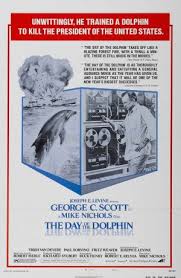
THE DAY OF THE DOLPHIN
US, 1973, 105 minutes, Colour.
George C. Scott, Trish Van Devere, Paul Sorvino.
Directed by Mike Nichols.
The name of director Mike Nichols calls up his four previous films Who's Afraid of Virginia Woolf. The Graduate (for which he received the 1967 Oscar for best direction), Catch 22, and Carnal Knowledge. Buck Henry, the screen writer wrote The Graduate and Catch 22 and had a hand in What's Up, Doc. George C. Scott is generally remembered for Patton and very strong roles. One wonders what Nichols, Henry and Scott are doing associated with the G-rated family thriller, The Day of the Dolphin. At least the critics are asking this, not allowing, perhaps, that everyone is entitled to some relaxation even in their work.
This means that The Day of the Dolphin is entertainment and discussion material for a wide range of audience. It is not a film masterpiece, although the photographs of the dolphins is very beautiful and accompanied by an attractive musical score. Rather, it is well made and light entertainment - with some messages worked into it.
As science-fiction, the film raises questions about dolphins who seem to fascinate mankind with their brains and sound systems. The message seems to be on the pessimistic side. The scientists are good, but idealistic and can be exploited and their work ruined by unscrupulous men.
As a conspiracy-thriller, the film is moderately exciting, with a rather humorously macabre example of poetic justice for the villains. At least, good sins here.
As an animal film, the film should please dolphin lovers, even if they are not convinced by the conversation between George C. Scott and Alpha – ‘Pha loves Pa'! Easy-going entertainment for the average audience.
1. What were your expectations from the title and atmosphere of the film? How do human audiences respond to the presentation of dolphins? What is so attractive about dolphins?
2. Was the story of this film possible? Can dolphins talk? Could they? Have they the anatomical and physiological apparatus to speak? The intelligence?
3. Was this interesting science fiction? What ingredients of science fiction did it use? Was it an interesting political thriller?
4. Comment on the success of the atmosphere at the beginning of the film with Jake Terrell giving his lecture, and the crosscutting to sequences with the dolphin? How was George C. Scott's giving the lecture credible? How did he get sympathy for Terrell and the dolphin? Did this engage audience attention for the whole film?
5. How much of an animal film atmosphere did it have? Especially in the sequences of the dolphin swimming, leaping, talking? The use of photography and music for the swimming of the dolphins - solemnising them in some way?
6. How interesting were the sequences of the training of the dolphins and the scientific explanations of what was happening? How did this engage audience attention? Which sequences best illustrated this?
7. How did the film put the point of view of the humane benefit of science? How was this counterpointed by the ironic use and misuse of humane science? What message was there about the use of science? Was it a pessimistic outlook on how man abuses what is good?
8. Critics called the film a "Boys Own" adventure. Is this true? Were you tricked by the villain? How well did the film indicate Mahoney as the villain - with lighting, sinister music, facial expressions, suspicious behaviour and trick us with the real villain's seeming so pleasant? Did the film utilise the action and the conspiracy well? How was tension generated to the audience?
9. Was the conspiracy plausible? That such a foundation should pool money and resources for a plot? How important was the factor of money in this film? The foundation? The foundation supporting the experimentation? what was the purpose of the plot? Was this well explained?
10. How interesting was the plan of planting the bomb? Was it plausible that the dolphins could do this? Was it made plausible in the film? what did you think of the poetic justice of the conspirators being bombed?
11. Comment on the plausibility of the dolphins warning each other and foiling the plot? Was this well prepared for in the demonstration and what the dolphins did for the fellowship?
12. What were the prospects for all concerned at the end of the film? What future did the Terrell's have? Should they have continued their experimentation with dolphins?
13. For what audience was this film made? What were the intentions of the screen writer and director? How would they have classified the genre of their film? Was this a successful film? An entertaining film? Why?